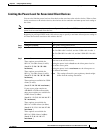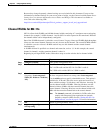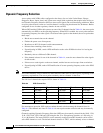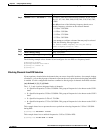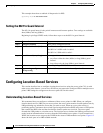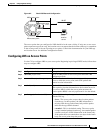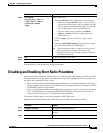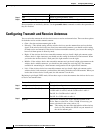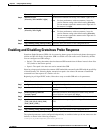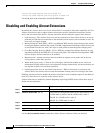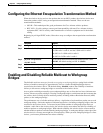
6-22
Cisco IOS Software Configuration Guide for Cisco Aironet Access Points
OL-29225-01
Chapter 6 Configuring Radio Settings
Configuring Location-Based Services
This example shows how to unblock all frequencies for DFS:
ap(config-if)# no dfs band block
Setting the 802.11n Guard Interval
The 802.11n guard interval is the period in nanoseconds between packets. Two settings are available:
short (400ns) and long (800ns).
Beginning in privileged EXEC mode, follow these steps to set the 802.11n guard interval.
Configuring Location-Based Services
This section describes how to configure location-based services using the access point CLI. As with
other access point features, you can use a WLSE on your network to configure LBS on multiple access
points. LBS settings do not appear on the access point GUI in this release.
Understanding Location-Based Services
We recommend that you configure a minimum of three access points for LBS. When you configure
location-based services (LBS) on your access points, the access points monitor location packets sent by
LBS positioning tags attached to assets that you want to track. When an access point receives a
positioning packet, it measures the received signal strength indication (RSSI) and creates a UDP packet
that contains the RSSI value and the time that the location packet was received. The access point
forwards the UDP packets to a location server. The location server calculates the LBS tag position based
on the location information that it receives from the LBS-enabled access points. If your network has a
WLSE, the location server can query the WLSE for the status of LBS-enabled access points. Figure 6-2
shows the basic parts of an LBS-enabled network.
Command Purpose
Step 1
configure terminal Enter global configuration mode.
Step 2
interface dot11radio {0 | 1} Enter interface configuration mode for the radio interface.
The 802.11n 2.4-GHz radio is radio 0
The 802.11n 5-GHz radio is radio 1.
Step 3
guard-interval {any | long} Enter a guard interval.
• any allows either the short (400ns) or long (800ns) guard
interval.
• long allows only the long (800ns) guard interval.
Step 4
end Return to privileged EXEC mode.
Step 5
copy running-config
startup-config
(Optional) Save your entries in the configuration file.




